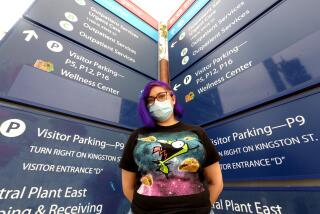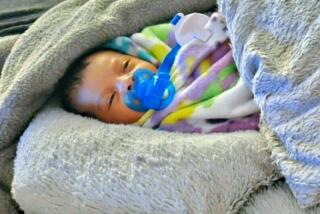Child Clinic Provides Basic Safety-Net Care : Itâs the First-Ever Visit to a Doctor for Most of the Patients at Hollywood Sunset Facility
Dr. Craig Stephens quickly spotted the potentially life-blighting problem with the high-spirited 5-year-old brought to the Hollywood Sunset Community Clinic for routine medical care.
âHe would grab a stool and bounce off the wall, quite literally,â Stephens said, shaking his head in amazement. âHeâd race up and down the hall here. He just couldnât sit still. Although heâs only 5, his mother already is almost unable to deal with his behavior.â
Stephens recognized an âattention deficit disorder,â a learning disability that typically turns children into school failures--unless they get potent remediation early. Children like this 5-year-old eventually make up about half of the teen-age delinquency roll, Stephens said, and later they often acquire long felony records.
Stephens put the boyâs family in touch with an Encino foundation that is now working with the youngster. He will be evaluated at 6, and the foundation staff will do all the remediating work needed for free, a step that Stephens hopes will make a positive impact on the rest of the childâs life.
An Average Month
He was one of 175 young patients treated during an average month at the Skid Row Childrenâs Clinic, open Tuesday afternoons and evenings in the Hollywood Sunset facility on Sunset Boulevard in the Echo Park area.
About three out of four youngsters brought in have never seen a doctor before, medical director Dr. William Vicary said. They lack basic pediatric care, such as polio and diphtheria shots. Currently staffed by volunteers and a small paid staff, the clinic serves parents who are referred by schools, child-care centers or, most often, by word of mouth.
A recent study by Pacific Bell Telephone Co. found that Hollywood Sunset was getting 2,000 phone calls per week, the majority about children, according to clinic executive director Teresa Padua.
Lone Safety Net
Needs appear to be mounting as medical costs soar, as more immigrants flood into the Los Angeles area and as unemployment leaves more families with no health benefits. For many, the free clinic is the only safety net under them.
âWe have to turn away as many as we see each week,â said Stephens, a family practitioner.
Itâs a last resort for some. Padua spoke of a 6-year-old boy with a broken arm that was healing crookedly, which could have left him handicapped for life. âWe got a call about it from one of the local day-care centers. They asked if weâd see him,â she said. In desperation, the childâs parents earlier had used somebody elseâs Medi-Cal card at a clinic. Now they were afraid to go back. âHis arm needed to be reset and although we donât do that here, one of our volunteer doctors took him to his clinic and did it for free, so it would heal properly,â Padua said.
Some incidents reflect the unique challenges of life as an immigrant, often an illegal one, who has witnessed violent episodes before experiencing culture shock in a new country.
Nurse practitioner Lisa Guravitz talked about the 9-year-old boy who recently came in with a severe fungus on his toes, a type of ailment that takes six months of treatment. âHe walked here from El Salvador,â she said.
âThis kid is petrified. When you talk to him, you find out he lives in a constant state of fear,â Guravitz said. âHe knows theyâre here illegally. Will they get caught? Will they be forced to go back?â
Stress-linked health problems abound. âThese are kids who sometimes have seen their parents dragged off and murdered,â she said. Itâs not surprising that they develop headaches and stomach pains or bed-wetting at 10, she observed.
Diseases of Poverty
The medical staff routinely treats typical diseases of poverty--parasites, anemia and vitamin deficiencies. âBecause thereâs such a high infant mortality rate where they come from, many of them (mistakenly) want their children to be fat,â Guravitz explained. She does basic nutrition education with parents, teaching them about the nutrient-rich foods needed for thriving children. Vitamin or iron supplements are prescribed from the clinicâs dispensary to bring kids up to par in energy and nutritional status.
When parents bring in their youngsters, they often then use the preventive services available for adults, Padua said. The staff does breast exams and cancer-screening Pap smears, along with family-planning education.
The rambling, 15-room clinic also includes a lab for simple medical tests, such as for TB and anemia, an emergency room for minor mishaps and a dental room. Glendale dentist Dr. Geoffrey Shanklin donated much of the equipment, then found colleagues who would contribute the rest. The only dentist currently volunteering at the clinic, Shanklin works every other Wednesday afternoon. Heâs looking around for other dentist volunteers and more needed equipment.
Every family bringing a child to the clinic also meets with childrenâs advocate Ruth Beaglehole, a marriage and family counselor, who does parent education centering on the mental health of the family. She has developed a child sexual abuse prevention program, and often discusses the subject with patients in the waiting room.
âTwo-hour waits arenât uncommon, so I use that time to talk to the people and work on abuse prevention. I know the community well and feel a rapport with them,â said Beaglehole, director for 13 years of the nearby Echo Park Child Care Center.
Major Foundations
The entire program, costing $4,000 per month, is funded by private donations and group contributions. Major contributors include the Atlantic Richfield, Carnation, Parsons, Pfaffinger and Weingart foundations, as well as the Florence B. Hallum Child Abuse Fund and TRWâs employee group.
Despite the grim, sometimes shocking problems brought to the clinic, physician Stephens expressed deep gratification for the good that can be done. The medical staff has uncovered instances of sexual abuse in very small children, and they have been taken into protective custody. Stephens has found youngsters who are trying to do academic work with undetected poor eyesight.
And this fall he heard âa funny heart murmurâ in a 4-year-old boy, then sent him on to specialists at Childrens Hospital. They discovered a lesion that could have been life-threatening or made the boy a âcardiac crippleâ by his 20s or 30s if it hadnât been caught and treated early.
âIt goes back to what I started out to do in becoming a doctor,â Stephens said. âIâm providing a service to people who desperately need it, who donât have easy access to medical care, and they appreciate it tremendously.â
âIâm Not Complainingâ
Stephens shares a mid-Wilshire practice, serving a mostly low-income clientele, with his physician wife. âMy wife and I together make less money per year than any of my classmates that I know of,â he cheerfully noted. âBut we chose it. Iâm not complaining.â
He often goes to the homes of children he treats--either because the families invite him or to check on how treatment is going. Along the way he picks up invaluable tidbits about family life that may impact on a childâs health.
âThey come to love and trust you. Itâs really pleasurable,â Stephens said. âIn fact, I have more fun than most of the colleagues I talk to.â
But at a price. A father himself, at times heâs felt an economic pinch. âWhen things happen that make life financially pressing--and because of the kind of work I do, that happens--I think about going someplace and making money,â he said, looking around the spare clinic room. âBut Iâve never been able to give this up.â
More to Read
Sign up for Essential California
The most important California stories and recommendations in your inbox every morning.
You may occasionally receive promotional content from the Los Angeles Times.










